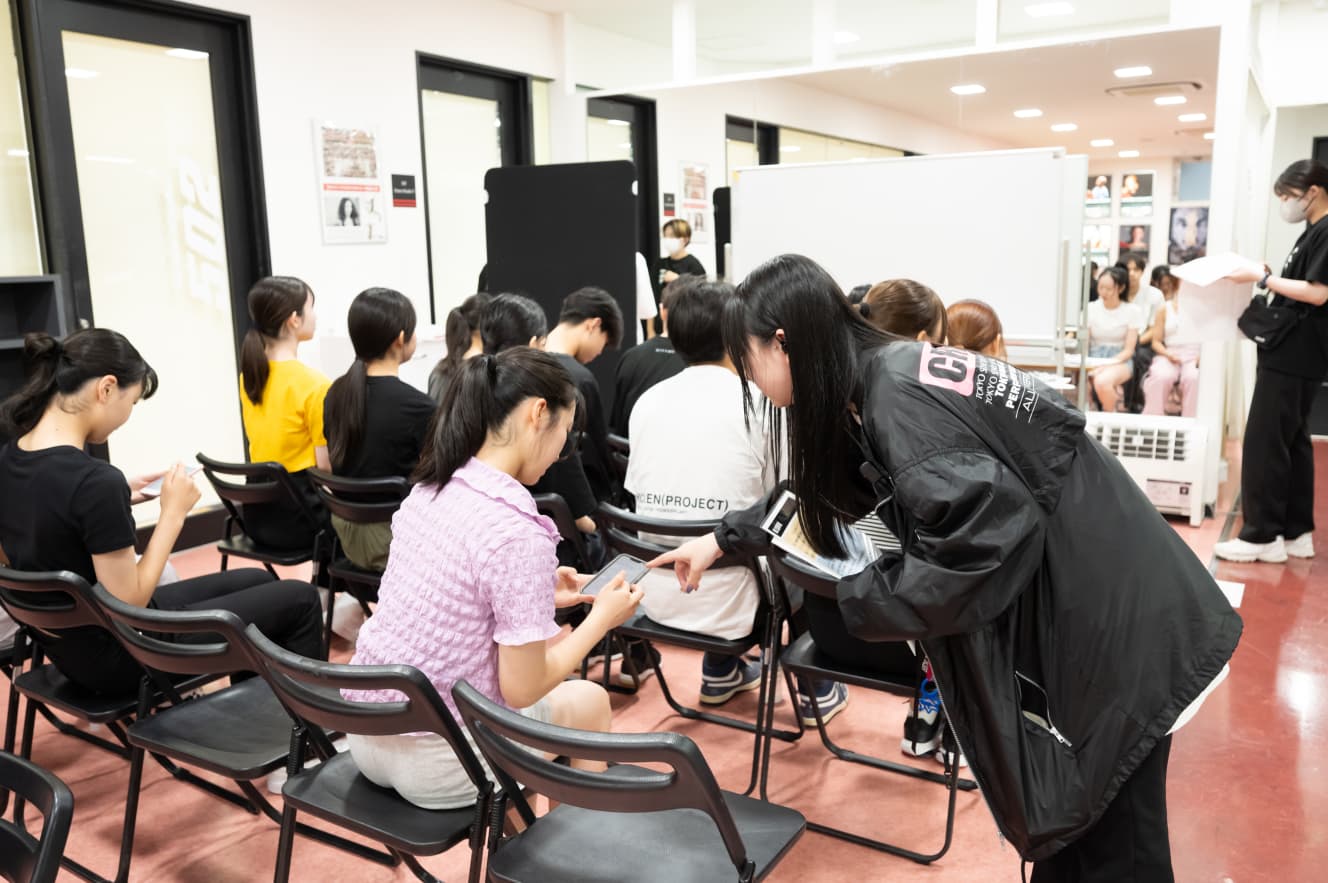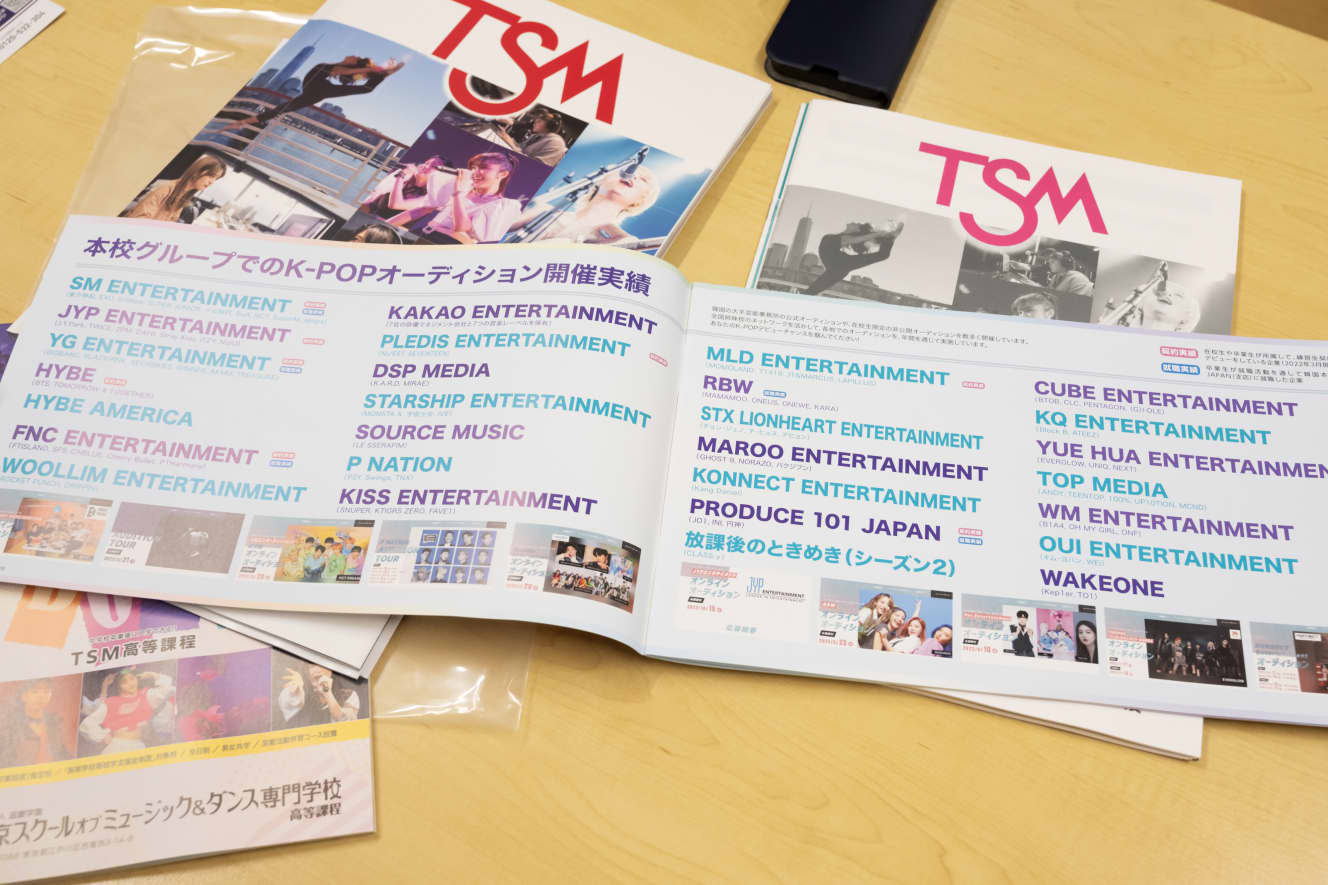The reason for the increase in the number of Japanese young people seeking employment in the K-POP industry: “My future is in Korea.
TSM to Open Major for K-POP Employment in ’20
On this day, an audition for a Korean entertainment agency that selects K-POP idol trainees was being held at the Tokyo School of Music & Dance (TSM), a professional training school for music and entertainment (Nishi-Kasai, Tokyo).

On the first floor of the school building, a long line of young men and women, mostly in their teens, waited nervously for the reception desk. Staff members in black uniforms were waiting for them and guiding them to the screening room. The total number of applicants for this audition was 900. The staff members who proceeded through the reception desk without delay and with an air of familiarity were unexpectedly young and appeared to be of the same age as the applicants. In fact, the staff members are students who attend TSM and are around 20 years old.
Why are students involved in the operation of auditions for a Korean entertainment agency?
Since its opening in 1988, TSM has been producing talented people who can be immediately effective in the music and entertainment industry.-POP Dancer & Artist” major (hereafter “Artist Major”) for aspiring artists.
The other is the “K-Pop Artist Manager” major (hereinafter referred to as the “Manager” major) for those who wish to work in the K-pop industry. The audition staff consists mainly of students majoring in the latter, who are responsible for the overall operation of the auditions as part of their practical classes.

In recent years, Japanese K-pop idols have been born one after another, and an increasing number of young people are eager to work in the K-pop industry, not just as aspiring idols.
Mr. Yosuke Kato, who was involved in planning the artist and manager majors and is currently in charge of the upper secondary school general music course, explains.
As the number of aspiring K-pop idols and artists has increased since around ’17, we have heard many voices from not only idol aspirants but also those who want to work in the K-pop industry.
For today’s youth, Korea is an object of admiration; there is a strong awareness that K-POP is setting global trends. I think they see the value in working in the globalized K-pop industry.
Of the 41 sister schools in Japan and overseas, 12 have established K-pop related majors. Currently, there are approximately 900 students enrolled in the artist major and 200 in the manager major.

Gaining on-the-job experience in practical classes
What kind of work does the manager major curriculum prepare students for?
The place of employment will be mainly in entertainment agencies. The jobs include manager, newcomer development, fan club management, merchandise planning and development, event planning and production, and promotion. I am also looking at jobs around concerts, such as ticketing and merchandising.
In Korea, entertainment agencies are responsible for everything from CD production and sales to concert management. Fan clubs differ from those in Japan in that fan clubs created by fans are recognized as official fan clubs, and images created by fans are used officially.
Students will learn about these structures and mechanisms of the K-pop industry, as well as the differences between different entertainment agencies. In addition, students will learn about producing and planning skills, as well as languages such as Korean and English. We also have a curriculum that covers the essentials of the music business, such as video editing and marketing.

TSM’s concept has been to “nurture the human resources required by the industry together with the industry. TSM has been focusing on practical classes conducted in collaboration with industry and academia, which it calls “corporate projects.
The corporate project assigned to students majoring in management is the management of auditions for a Korean entertainment agency, as mentioned at the beginning of this article.
Auditions are frequently held at sister schools around the country, and students form teams of a dozen or so to take charge of all operational tasks, including promotion to attract applicants, setting up the venue, reception on the day of the audition, information, and filming.
One or two judges will be coming to Japan from Korea, and I will also provide support for them. Sometimes new development staff who have discovered famous artists who are active around the world come to Japan, and they sometimes inspire me, and I learn a lot by watching them closely as they judge.
The judges look at the students’ work with a strict eye. Sometimes they receive high evaluations, and sometimes they receive job offers. Each time I tell the students, “They even look at the way you arrange the chairs in the waiting room,” and over time they become aware of what they are expected to do and what they should do, and are able to take action on their own initiative. This is where the importance of gaining on-the-job experience lies.

Getsuyuki Yamaguchi, 20, who entered TSM two years ago, has been involved in the organization of more than 30 auditions so far. She says that she is always conscious of “making sure that the applicants feel happy that they applied.
The day of the audition is an important day in the applicant’s life. I want them to have a meaningful time, so I think about what I can do to make that happen. For example, we set up a waiting area where they can spend the waiting time comfortably, and we make sure that there is a smooth route for them to get from one place to another. I try to make sure that people are properly informed so that they don’t get lost or feel uneasy.
When she was a high school student, she fell in love with K-POP and set her sights on becoming a manager to support the sparkling Korean idols. After entering the school, he became involved in managing auditions, which sparked his interest in the job of developing new talent.
Standing by the judges at the auditions, I gradually became aware of what kind of person they were looking for in a trainee, and I became interested in the job of discovering new talent,” he said. In the future, I hope to work in Korea, but first I hope to find a job at a Korean entertainment agency that has a branch in Japan.

Easier to get hired by the Japanese branch office
What kind of skills are Korean entertainment agencies looking for in Japanese staff?
Recently, they tend to be looking for video editing skills to put in images and tickers for Instagram and X (formerly Twitter), but what they need most are “people skills and communication skills,” according to one of them.
The most important thing is “people skills that make people want to work with this person. The number of Japanese who want to work in the K-pop industry is increasing, and the quality that the Korean side is looking for is getting higher.
Although the manager major has only been in operation for a short time, many graduates have been able to find employment at Korean entertainment agencies. Some are fluent in Korean and have been hired by the head office, but most are employed by the Japanese branch.
There is a strong desire in the receiving K-pop industry to capture the huge Japanese market. Japanese staff who understand Japan are indispensable for promotions aimed at Japan. I believe this trend will continue.”

As the global popularity of K-pop continues to grow, more and more people from all over the world are interested in K-pop-related jobs in Korea, from professionals such as video creators and hair/make-up artists to staff at entertainment agencies. One wonders how many Japanese who will be active on the front lines of the industry will be born among them in the near future. In the future, we would like to take a closer look at the Japanese who support the K-pop industry.
Interview and text: Keiko Tsuji PHOTO: Ayumi Kagami